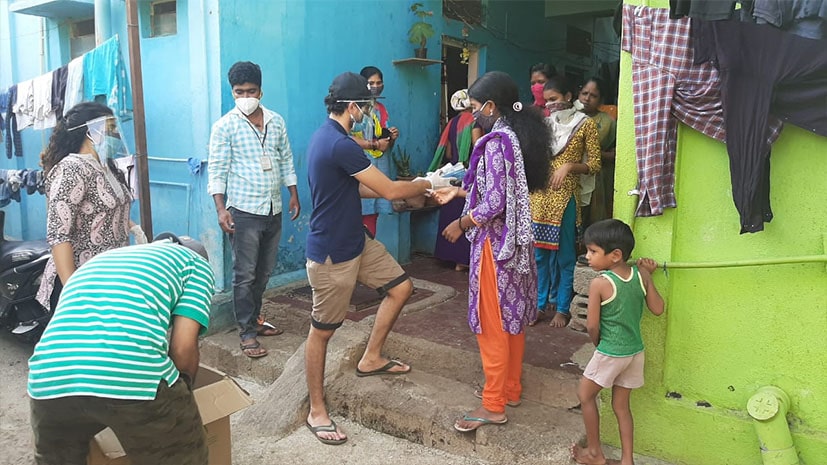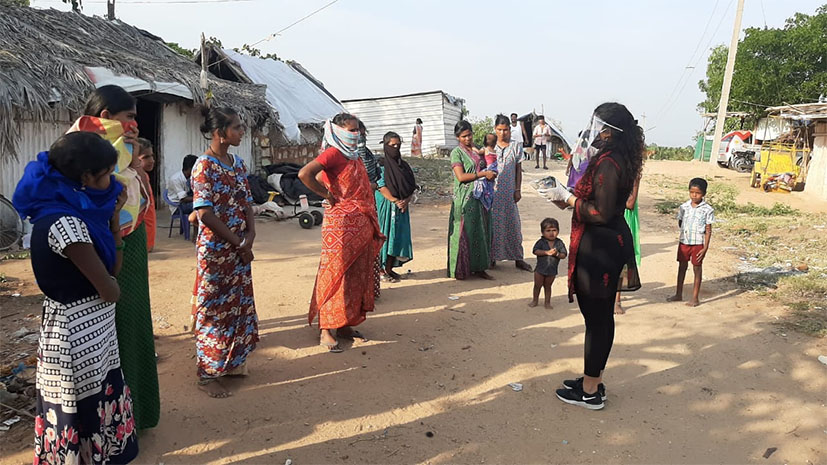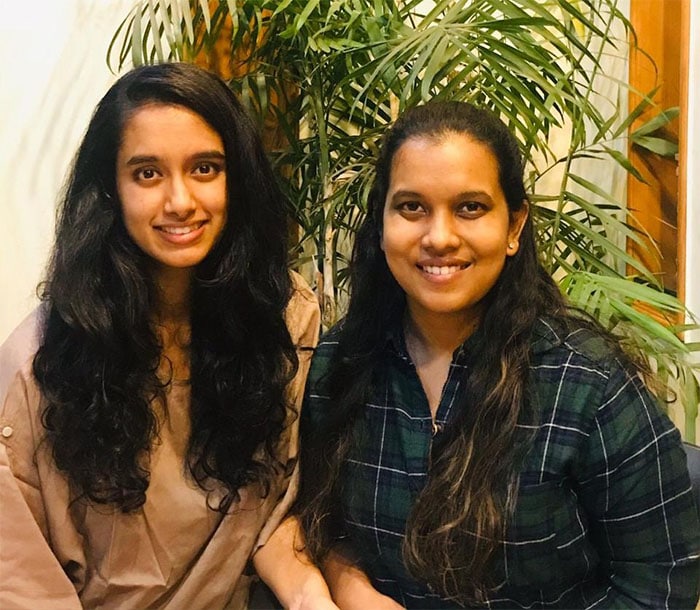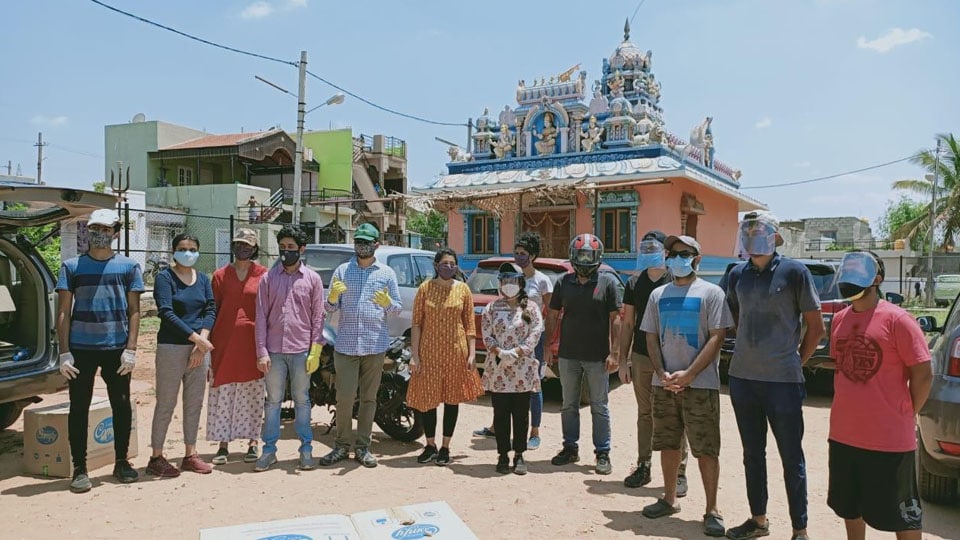Two young Mysureans distribute 14,000 Menstrual Hygiene Kits
By B.N. Ramya
As a result of pandemic and the lockdown that followed, we were witness to people being rendered jobless and shelterless on one side; and the same situation on the other end, brought to the fore ‘humanity’ with many lending their helping hands to the needy fellowmen by distributing grocery kits. Amidst all these, forgotten were the womenfolk who were in need of good menstrual hygiene, which is still considered a taboo to speak out it public. Taking note of this, two Mysureans — Manasa Rao and Dr. Sagarika Nithyanand — have taken up distribution of Menstrual Hygiene Kits.
Speaking about the initiative, Dr. Sagarika said: “With the outbreak of COVID-19, we noticed that everybody was distributing grocery kits but nobody was talking about menstrual hygiene. It was painful to note that majority of women have no access to sanitary products. This motivated Reachout India, a non-profit organisation founded by my friend, Manasa, to come out with menstrual hygiene kits, comprising sanitary pads (7 pads), bathing soap and hand sanitisers, to be distributed among daily wage and migrant workers. The kits, each costing approximately Rs.60, are handpacked by volunteers using newspaper covers bought from the migrant workers who were sheltered at Nanjaraja Bahadur Choultry in Mysuru. During the distribution drive, volunteers even impart basic knowledge on how to use and dispose of a pad.”

On how many needy people they had reached through this drive, she said: “We started off with a goal of distributing about 1,000 kits in Mysuru, but with the overwhelming support of the local community, today, we have distributed over 10,000 kits in Mysuru alone. Our largest distribution drive was at Bharatnagar slum where 2,080 kits were distributed door-to-door. We have been relying on ground-support from slum associations, local Corporators and organisations like Sri Sthanakvasi Jain Yuva Sanghatan and Swami Vivekananda Youth Movement (SVYM).”
The other cities where we have distributed kits include Pune (1,000 kits), Dharavi Slum, Mumbai (2,500 kits) and 500 kits in Refugee camps in Delhi, she said adding that recently, a team of doctors including Dr. Nikita Soans (Dermatologist), Dr. Shibina Shetty, (Paediatrician) and Dr. Sagarika Nithayanad (Physician) also conducted a medical camp at Erakunty as a part of their follow-up programme.
Explaining about the plight of women they came across during their ground research, she said: “After the first round of distribution, we learnt that as they did not have money, a lot of daily wage/ migrant workers were reusing disposable pads and using alternatives such as dried cow dung, coconut husks and rag cloth. Even if they had some money, they preferred to spend it on their children. This incident was an eye-opener as it brought to light the abysmal living conditions of women during a pandemic and the lack of attention to menstrual hygiene. In a lot of slums, we found out that women often resorted to burning, burying or flushing it down their toilets.”

Dustbins and Manual
“During our drive, at one place, we noticed that women were disposing off the sanitary pads in a water channel and the same water channel was used for bathing and cleaning vessels too, which was extremely unhygienic. We thought there was no point in educating them about proper disposal of sanitary pads as we found that there were no dustbins at some places. Hence, we plan to set up dustbins specifically for sanitary pads in different locations in Mysuru and also set up dustbins in slums where there are no waste management systems in place. with the help of MCC,” she said.
Explaining about their future plans, she said: “We noticed that many young girls, who are 12-13 years of age, and just started their periods, are really unaware of how to deal with it. Most of them are shy to talk about it even to their mothers and hence, the chances of them getting right information about menstrual hygiene are very less. So, we are thinking to introduce a Menstrual Hygiene Manual for local government schools as a part of their curriculum.”

The support system
A team of 15 volunteers, all aged between 22-28 years, regularly participated in the Drive. They include Krishna Rao, Dr. Sahas Nithyanand, Ishraq Fazal, Shariq Fazal, Dev Devaiah, Casuarina D’sa, Disha Prasad, Anek Chugh, Rachita Prabhu, Pradyumna Devraj, Dr. Shradha Surana, S.P. Abhinav, Nikita Rajpal, Pratheek Poovaiah and Mohit Bekal.
“Our drive could reach larger section of women with the support of volunteers. All have full time jobs. They are working from home and take some time off to come and help in drive. Initially, we put money from our pockets. Then we started making posters and posted it on Facebook and Intagram seeking donations. We got good support from the local community through their donations in both cash and kind. A few people from Mysuru who contributed to our cause in a big way include Arjun Ranga, NR Group, C.R. Shashidhar, DRC Cinmas, M.N. Padaki, Chethan Prasad, Sunil Kumar, H.V. Prasad, Adarsh and B.G. Muthappa,” said Dr. Sagarika expressing her gratitude.
About Reachout India
It is a non-profit organisation headquartered in Pune, with branches in Mysuru, Delhi and Mumbai. Its objective is to empower the underprivileged through two interventions: a children’s education initiative (Project Rise) and a women empowerment wing. Project Rise aims at changing the public education landscape by improving the workings of local Government Schools. The women empowerment programme focuses on providing free legal aid for survivors of domestic abuse through 24×7 helpline and runs projects to improve women’s health and well-being. Those interested in contributing to Reachout India can contact Mob: 98862-45000.








Recent Comments